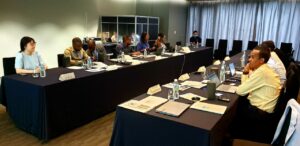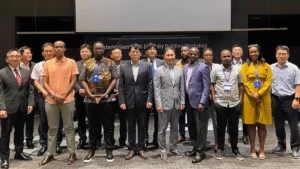24-28 July 2023, Seoul, Korea. The Government of Rwanda has prioritized the transition to e-mobility for all vehicle types using a combination of incentives and favorable policies designed to promote the uptake of electric vehicles. However, due to the high capital cost involved with the purchase of electric buses, public transport has largely been isolated from the electric vehicle penetration that has occurred across motorcycles and cars. Therefore the government plans to address current barriers of high costs associated with public transport infrastructure and procurement of electric buses through the mobilization of climate finance from ITMOs in collaboration with the Republic of Korea.

From 24-28 July a delegation that comprised of officials from Ministry of Finance & Economic Planning (MINECOFIN), Ministry of Environment (MoE) ,Rwanda Environment Management Authority (REMA), Rwanda Energy group (REG), Rwanda Green Fund (FONERWA) Rwanda housing authority (RHA), City of Kigali led by Ministry of Infrastructure, Rwanda (MININFRA) travelled to Korea to participate in capacity building & knowledge sharing workshop as part of GGGI Rwanda-Korea Knowledge Sharing Program to enhance institutional capacities to facilitate use of ITMO through e-mobility. The transfer of ITMOs has been identified as a potential source of climate finance. REMA has already successfully implemented carbon credit projects under the Clean Development Mechanism under the Kyoto Protocol and is keen to transition to ITMOs under Article 6 .The objective of the project is to address current barriers of high costs associated with public transport infrastructure and procurement of electric buses through the mobilization of climate finance from ITMOs and improve institutional capacity of e-mobility and ITMOs through the knowledge exchange of e-mobility technologies and regulatory framework for ITMOs with the Republic of Korea. Project activities include:
- Assessment of Rwanda ITMO transaction Structure and key relevant stakeholders
- Assessment of Global ITMO cooperation cases including Korea
- Market assessment of electric mobility technologies including vehicles and charging infrastructure
- Identification of potential e-mobility project or program linking to ITMO’s
Output 2: Capacity building programs include:
- Capacity building workshop for introducing mechanisms to facilitate learning and enable trading under Article 6. between Korea and Rwanda
- Capacity building workshop for introducing Korea e-mobility policies/regulations and key technologies including e-buses and charging stations
- A workshop to identify potential ITMO projects between Korea and Rwanda through electrification of transportation.

Rwanda submitted its updated NDC already in May 2020. The country made an unconditional mitigation pledge to reduce GHG emissions by 16% against BAU by 2030, while the conditional pledge could result in an additional reduction of 22% against BAU. Rwanda has provided a clear definition of conditionality , which means Conditional mitigation measures are activities that can be implemented “only conditional upon the availability of international support (including funding and other types of support from donors, climate finance and potentially carbon markets) (Government of Rwanda 2020, p.33).” Article 6 is therefore expected to support conditional mitigation efforts. Transport is recognized as one of the key elements for socio-economic and environmental development in Rwanda (REMA 2013). The transport sector, driven by the increasing urbanization and also by the population growth, is expected to increase its emission from 0.53 million tCO2 in 2012 to 3.1 million tCO2 in 2030 (REMA 2015). The Government of Rwanda envisages enforcing fleet renewal and scrappage (heavy, medium, mini-bus), higher efficiency fuels and low carbon technologies for new vehicle, setting emission standards (equivalent to EU standards) and standardized compliance and inspections for non-Rwandan registered vehicles.
GGGI has actively supported E-mobility implementation in more than 17 member countries, supporting members in the transition of their transport sector to sustainable modes including E-mobility and non-motorized transportation. Specifically, feasibility studies on the introduction of electric buses have been developed in Jordan, Cambodia, Nepal, Lao PDR, Fiji and India. Policy recommendations and/or project preparatory studies that support e-mobility, public and sustainable transport have been developed in cooperation with governments in Mexico, Morocco, Ethiopia, Cambodia, Mongolia, Rwanda, and Myanmar, such as for example recommendations on technical standards for electric vehicles in Lao PDR, or Low Emission Development Strategy (LEDS) for land transport in Fiji.
Sustainable transport has been a focus area for GGGI since its inception. Sustainable Transport and E-Mobility align with GGGI’s objectives of 1) scaling up existing electric mobility initiatives, including delivering policy advice to projects and programs in countries; conducting sector assessments, assessing technology options where relevant; identifying and conceptualizing sustainable project models; and leading the content side of knowledge sharing programs, 2) expanding its scope towards NMT (forms of travel that do not rely on an engine or motor for movement, such as walking and bicycling), and 3) stepping up the results into impacts that will be measured primarily through the Strategic Outcomes defined in GGGI’s 2030 Strategy. GGGI plans to support members in the transition of their transport sector to sustainable modes, including low-carbon mobility and non-motorized transportation. Moving forward MININFRA plans to address current barriers of high costs associated with public transport infrastructure & procurement of electric buses through the mobilization of climate finance from ITMO in collaboration with GGGI and the Republic of Korea.
